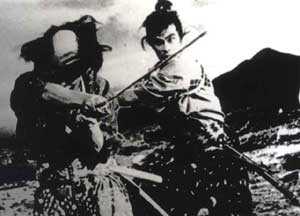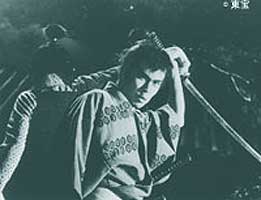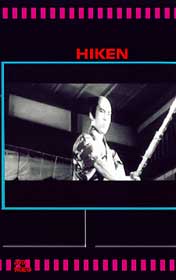Hiroshi Inagaki is best known in the west for his Toshiro Mifune vehicle Samurai Trilogy. But one of his most artful films is practically unknown, Hiken or The Secret Sword, which has long had a rarely shown 35 mm subtitled print available with the title Young Swordsman. It has been issued as an unsubtitled DVD, & we can only hope that a subtitled version is made available by one of the few enterprising distributors of Japanese classics in America, as it has long been my favorite Inagaki film.
A black & white film with the elegance of an Akira Kurosawa classic, Young Swordsman stars Shogoro Ichikawa as Tenzen the young swordsman possessed by his own evil sword style, & Hiroyuki Nagato is Chojuro the opponent who must learn to defeat evil. This theme is echoed in the classic Sword of Doom (1966) starring Tatsuya Nakadai as the swordsman who develops a deceptive sword style, & becomes himself deceitful, on the premise that the sword reflects the soul, & an evil sword style corrupts the soul.
SPOILERS GALORE: It is 1663. Tenzen Hayakawa feels he was born twenty years too late to prove himself as a samurai. The Kokura clan has been ordered by the Tokugawa shogunate to tear down their fortified castle. A new law denies samurai the privilege of duelling to the death. Tenzen's minor ten-koku (rice producing land) payment as a vassal is more than many samurai have in these days of peace, but he is too hot-headed & aware of his capabilities, so cannot settle for this.
 Tenzen is a young swordsman eager to prove his prowess & the validity of a new fighting technique which he believes is humane, because it utterly defeats the opponent without killing. His style is actually a lot more cruel than he realizes, & the cruelty of his sword does corrupt his spirit, though he stubbornly cannot see the truth of it. Tenzen is a young swordsman eager to prove his prowess & the validity of a new fighting technique which he believes is humane, because it utterly defeats the opponent without killing. His style is actually a lot more cruel than he realizes, & the cruelty of his sword does corrupt his spirit, though he stubbornly cannot see the truth of it.
He admits, "Yagyu & Musashi styles were devised in actual duels," not in a dojo school, thus he even resents the success of being made assistant instructor. He wants to experience that moment of life or death certainty of one swordsman defeating another.
Certain samurai of mediocre fighting ability have become street-killers cutting down beggars at night because they share Tenzen Hayakawa's frustrations. As no one will confess to the killings, Tenzen is instructed to make a confession, as he's a low-ranking retainer. He is not being sacrificed, since if he claims the beggars insulted him, he can get off for the crime, since by law samurai still have the right to kill anyone beneath them who insults their dignity.
Tenzen says he wouldn't mind taking the blame, except the slaying was done by someone unskilled, & would be an insult to his sword to make a false confession. He is blamed anyway, but then the matter is dropped as though settled, to Tenzen's deep chagrin.
The much legended Musashi Miyamoto (Ryunosuke Tsukekata) is by this time an older man living peacably, devoted to Zen reflection & woodcarving. He visits Kokura clan since his own son will be employed by them. It is a rare occasion & the clan elders make every conceivable preparation for his comfort & entertainment.
Young Tenzen has even dreamed of this great warrior & tries everything to see him, up to & including standing outside the house Musashi is staying at & announcing his challenge to duel. The young man is rebuffed, yet Musashi tells the elders that Tenzen's boldness was admirable & to respect it.
The next day gossip is divided between those who deplore the audacity of a low vassal, those who admire Tenzen for the attempt, & those who are merely jealous that Mushashi praised him. That night, the rest of the dojo members stand outside the house where Musashi is staying. The lord of the house chases them away & despite being somewhat of a dotard completely understands they were mimicking Tenzen without sharing an ounce of his gutsiness.
The mimics angered to have gotten nowhere with their ploy cut down five beggars that night. It could not be easily excused by invoking the privileges of samurai. Musashi is therefore asked to lecture these wild youths at their dojo.
Musashi's lecture becomes an argument between generations. One student says it is the right & privilege of samurai to kill men of low station even if only to test swords & practice perfect cuts. Another says that Mushashi had more opportunities to perfect his form in real duels; his was a better time for samurai. Musashi ends up suggesting they should prove their manliness by studying the abacas, not cutting down innocent beggars under cover of darkness.
The young men are aghast at this insult, as only merchants study the abacas, & as Yamaga Soko wrote, "The man covetous of salary must feel shame in his heart." Musashi ends his lecture by grabbing his sword, lifting one of the large tatami mats from the floor, & cutting it verticially so that it falls in two pieces. The students are so impressed they are almost willing to accept his damnable advice, all except Tenzen who is caught smirking.
A town elder wants to know if Tenzen is so sure he could have cut the tatami in that manner. Tenzen says, "Of course." He is told that if he fails, he must die. He lifts a tatami & cuts it horizontally rather than vertically, passing his sword through twice as much matting as had Musashi. He then snears, "Is this martial art? I consider it a stunt."
The elders are greatly upset by Tenzen's hot-headed lack of respect toward their important guest, yet Musashi informs them privately that it would be wrong to suppress the young man. "At first he reminded me of my nemesis Kojiro," says Musashi, remembering his own young years. "But he is more like me at that age."
Despite Muasashi's words, the clan has felt decreasingly able to control Tenzen. Therefore they move against him as soon as Musashi departs. He is placed under house arrest for a hundred days, but he decides to go on his musha-shugyo warrior's pilgrimage instead, & departs for Nara.
As he has disobeyed the clan, they send a man to kill him or bring him back for punishment. The man is Chojuro Hoso-o, Tenzen's lifelong friend & veritable brother, though Tenzen was adopted.
 While in Nara, Tenzen studies alone & perfects his huyuki "snowstorm" cut which he is convinced will revolutionize swordsmanship. It's a secret method which spares the life of the defeated opponent. In essence, it is a fake block which sneaks beyhind the tsuba (swordguard) & cuts off both thumbs of the opponent so that he can never again weild a sword. While in Nara, Tenzen studies alone & perfects his huyuki "snowstorm" cut which he is convinced will revolutionize swordsmanship. It's a secret method which spares the life of the defeated opponent. In essence, it is a fake block which sneaks beyhind the tsuba (swordguard) & cuts off both thumbs of the opponent so that he can never again weild a sword.
Tenzen believes that as time changes & duelling to the death becomes less respectable, sword styles must change to be more humane. Yet the "humanity" of crippling one's opponent rather than killing him outright is questionable from the start, denying a samurai his desire to both live, & die, by the sword.
As Tenzen wanders through the tale becoming increasingly cruel, Chojuro follows in his wake studying & analyzing the devilishly undefeatable style. But even when he solves the secret of the snowstorm cut, he finds he hasn't the heart to kill his foster brother, but returns to his clan & makes every effort to have him reinstated. Tenzen is even resigned to the possibility of committing seppuku if that is their decision, but they refuse him even this honorable rite & insist he be merely executed.
It is shortly thereafter that Tenzen visits the clan elders one by one & fights them, removing their thumbs. He becomes a wanted man, though some daimyo (lords) have sympathy for him, & he might have come under the protection of another clan but for one rather dreadful problem: His swordstyle is corrupt & evil & it is altering his personality.
When Chujuro meets Musashi in his hermit's retreat & explains what Tenzen has been going through, Musashi's previous opinion of Tenzen's potential greatness is diminished. Musashi tells Chojuro to convince his brother to abandon the evil style, for "the sword is a reflection of the spirit." If Tenzen is already consumed by bloodlust, Musashi suggests that Chojuro put all doubt behind himself & kill his brother out of mercy.
In the climactic duel between Chujuro & Tenzen, never was a cry of "I won!" ever so ironic, as Chujuro falls victoriously dead & Tenzen is "humanely" spared. END SPOILERS ALERT
A small budget compared to other of his films, Inagaki was forced to rely on a solid plot, good timing, & gorgeous cinematography, rather than lavish sets & technicolor as in his big commercial epics. It is frankly a better film than his costlier productions.
It's odd to say, but the fact that it does not have Toshiro Mifune in it also helps. What Kurosawa used to strengthen films -- controlling Mifune's tendency toward the comedic except where really needed -- Inagaki used to excess or was simply incapable of holding in check.
In Mifune's minor role in Inagaki's Whirlwind (1964), he overwhelms the other characters, not because the other actors were lousy by comparison, but because Mifune becomes too much larger-than-life & just keeps looking like Mifune even with a basket on his head.
In Whirlwind he is playing a komuso beggar-monk, his head completley hidden inside a lampshade hat, yet he can steal a film with just his shoulders.
By comparison, Inagaki & his cast for Young Swordsman have this film firmly in control. Striking characters are built up with tasteful direction, Kuzuo Yamada's excellent cinematography, & a harrowing script drawing characters to their inevitable fates.
It also has the grand spice of Musashi Miyamoto's presence, a figure who certainly could have been Mifune in this substantive cameo stealing the show entirely intead of Ryunosuke Tsukekata adding tact & grace. Tsukekata's performance serves as a kind of coda to inagaki's most famous film set, Samurai Trilogy (Miyamoto Musashi, 1954, 1955, 1956) with Toshiro playing Musashi in his prime.
I'm always interested in the depiction of women in samurai films. Inagaki is sentimental toward women, whose existence in the lives of strong men generally turns out to be problematic rather than an asset.
Sei, the woman Tenzen was to marry, only half-betrays him when he falls from favor & becomes an inappropriate husband, so is only half as annoying as most women in Inagaki features.
Miwa, the woman Tenzen meets in Nara & who loves him best, strives in her introductory scenes to learn to play tsuzumi (hand drum) with as much sincerity as Tenzen studying swordsmanship. This is a really nice introduction of the character. But too soon her precious drum vanishes from her interest as she becomes one of Inagaki's insufferable hero-followers, tripping awkwardly along the trail & being utterly helpless all the time.
Chujuro's travels bring him briefly into contact with a young woman highly skilled in swordplay, at least in the relatively safe environment of the dojo. But this attention-grabbing woman vanishes more swiftly than she appears, & serves no purpose in the story beyond a momentary decoration.
The swordswoman is written out of the script before she can do anything interesting because Inagaki simply prefers whiny women, like the heroine of Whirlwind who was literally picked up & carried off by her sauntering boyfriend in the end, though there's absolutely nothing wrong with her legs, women's helplessness defining the happy ending.
The soundtrack is a great plus for Young Swordsman. The film is well-integrated music to sound to action, incorporating shakuhachi & traditional drum beats, plus the plot calls for Sei to play koto, & Miwa to play tsuzumi.
copyright © by Paghat the Ratgirl
|

 Tenzen is a young swordsman eager to prove his prowess & the validity of a new fighting technique which he believes is humane, because it utterly defeats the opponent without killing. His style is actually a lot more cruel than he realizes, & the cruelty of his sword does corrupt his spirit, though he stubbornly cannot see the truth of it.
Tenzen is a young swordsman eager to prove his prowess & the validity of a new fighting technique which he believes is humane, because it utterly defeats the opponent without killing. His style is actually a lot more cruel than he realizes, & the cruelty of his sword does corrupt his spirit, though he stubbornly cannot see the truth of it. While in Nara, Tenzen studies alone & perfects his huyuki "snowstorm" cut which he is convinced will revolutionize swordsmanship. It's a secret method which spares the life of the defeated opponent. In essence, it is a fake block which sneaks beyhind the tsuba (swordguard) & cuts off both thumbs of the opponent so that he can never again weild a sword.
While in Nara, Tenzen studies alone & perfects his huyuki "snowstorm" cut which he is convinced will revolutionize swordsmanship. It's a secret method which spares the life of the defeated opponent. In essence, it is a fake block which sneaks beyhind the tsuba (swordguard) & cuts off both thumbs of the opponent so that he can never again weild a sword.